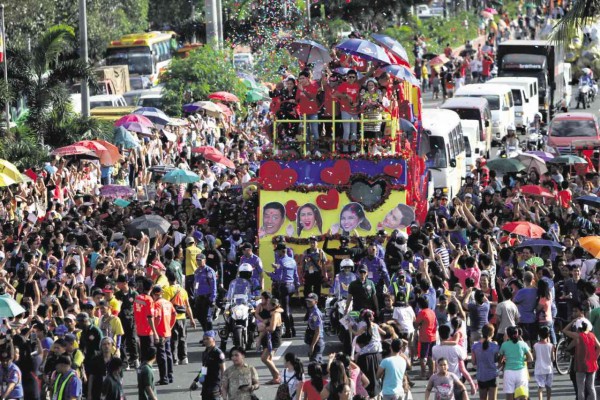MMFF update: Fest to go national
AFTER two Congressional hearings in January, the Technical Working Group (TWG), which is tasked to initiate reforms in the Metro Manila Film Festival (MMFF), has had several meetings, “both formal and informal,” in February.
Eugenio “Toto” Villareal, chair of the Movie and Television Review and Classification Board (MTRCB), told the Inquirer that Rep. Alfred Vargas, a member of the House Committee on Metro Manila Development and also a TV-movie actor, has asked the TWG “to help in the drafting of a law that would strengthen the film festival system and introduce reforms thereto.”
The House Committee on Metro Manila Development, which is chaired by Rep. Winston Castelo, spearheaded the Congressional hearings in January, which arose from the disqualification of Erik Matti’s “Honor Thy Father” in the best picture category of the MMFF last December.
The same House committee has assigned to Villareal the role of resource person in the TWG.
During the House committee hearings, the task of reforming the MMFF was passed on to the TWG. Villareal explained that in the TWG meetings, there was a move to “make the film festival nationwide in scope.”
“I also proposed a longer period (30 days) devoted to Filipino movies than the current 14-day run of the MMFF,” he related. “The current thinking is to have another 14-day festival in July. This will give the Filipino film industry a period of 28 days, during which theaters will only show local movies.”
All this, of course, is in line with the MMFF’s original goal of revitalizing the local movie industry. Villareal asserted that a law is needed to institute significant changes in the MMFF.
“There must be legislation,” he pointed out. “The ‘law’ that governs the MMFF is Executive Order No. 86-09 of the Metro Manila Commission (MMC). It uses the amusement tax waiver as a system for incentives.”
The MMC later evolved into the Metropolitan Manila Development Authority (MMDA), which mounts the MMFF every year.
During a breakfast forum held at the Tycoon restaurant in Malate, Manila, Villareal outlined the legislative history of the MMFF.
Through the decades, the main mandate of the MMDA has been refocused toward the “delivery of basic services,” he recounted, leaving the “promotion of culture and the arts” out of the picture.
Is there a need to look for “another engine to run the festival?” Should there be more or less government participation vis-à-vis industry involvement?
“What we have to define is the nature of government participation,” he said. “If there are more incentives by law, and there will be support from various government agencies and LGUs (local government units), so much the better.”
He noted: “The LGUs of Metro Manila should be commended for their support of the MMFF through the years. But there must be room for artists to determine guidelines and select winners.”
In sum, he referred to the MMFF’s current situation as the “sandbox” period. “The MMFF, which is still being run under the auspices of the
MMDA, can try to institute reforms at its own level, then recommend best practices to Congress.”
Since it is an election year, overhauling the MMFF may get pushed to the back burner, though. “The proposed bill will have to wait for a new Congress,” he clarified. “Representative Vargas, if reelected, hopes to introduce it with several other lawmakers.”
In the meantime, will MMFF 2016 push through?
Villareal remarked, “Since EO 86-09 is still in effect, yes. MMDA Chair Emerson Carlos is calling for a meeting of the 2016 MMFF executive committee this month.”
Actress and Execom member Boots Anson-Roa told the Inquirer that the meeting is on March 11. Villareal is an ex-oficio member of the MMFF Execom, as well.
